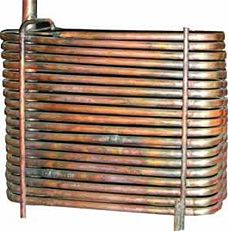- Coil (chemistry)
-
A coil, in chemistry, is a tube, frequently in spiral form, used commonly to cool steam originating from a distillation and thus to condense it in liquid form. Usually it is of copper or another material that conducts heat easily. Coils are often used in chemical processes in batch reaction or mixing tank as internal source of heat transfer.
Categories:- Laboratory glassware
- Chemistry stubs
Wikimedia Foundation. 2010.

